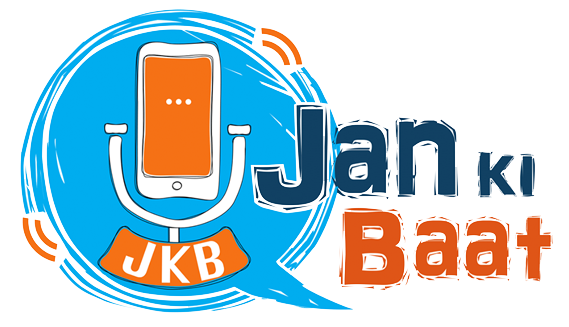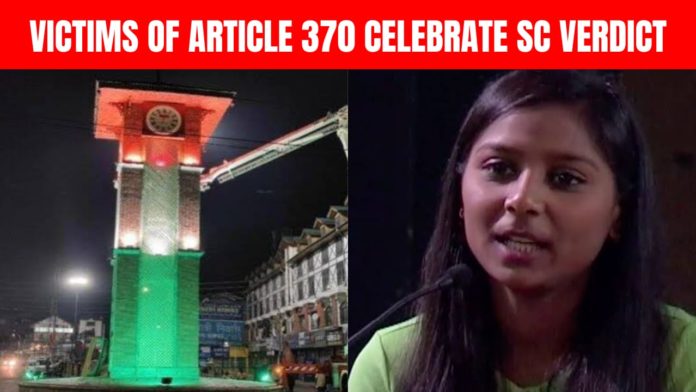Sagarika Mitra, Content Head of JAN KI BAAT, highlights the stories of the victims of Article 370
Radhika Gill, Eklavya Valmeken, Melu Ram, Roop Lal, Sagar Sahi, Sher Bahadur Rana – you may not have heard their names or read their stories. But today, as the people of Jammu & Kashmir celebrate the Supreme Court’s verdict upholding the Central Government’s decision to abrogate Article 370 four years ago, the real victims of Article 370 and 35 (a) feel a sense of vindication. For them, the Supreme Court’s judgement marks the final burial of a constitutional provision that had long enabled discrimination against them, their families and the people of their community.
Radhika Gill stands as a living testament to resilience. Born into the Valmiki community, Radhika’s life was etched with the promise of dreams and the cruel reality of discrimination. In the 14th State Athletic Championship of Jammu and Kashmir, she emerged not just as a bright student but as a top athlete, achieving distinction in “Shot Put” and the “100-meter Race.”
Yet, beneath the accolades, Radhika was ensnared in the web of Article 35A. Denied a “Permanent Resident Certificate” by the state of Jammu and Kashmir before the abrogation of Article 370 and 35(A), Radhika refused to be silenced. In 2019, at the age of 18, she challenged the constitutional validity of Article 35A along with two others.
Her journey is an embodiment of courage. Radhika fought not only against a discriminatory provision but also against an arbitrary attitude that denied her constitutional rights. Her battle wasn’t merely legal; it was a crusade against a system that had relegated her community to the fringes of democracy.
In the heart of Jammu, the Valmiki Community, comprising 8,000 to 10,000 resilient individuals, has witnessed a transformative journey marred by discrimination and injustice. Eklavya Valmekan, one of the Valmikis who approached the Supreme Court along with Radhika Gill, in support of the abrogation of Article 370, today expresses happiness over the Supreme Court’s verdict. Before the abrogation of Article 370, members of the Valmiki community were ineligible to vote or apply for state government jobs – basic human rights were denied to them and their dreams were stifled.
The Valmiki Community’s story is woven with promises made in 1957 when their great-grandfathers were brought to Jammu from Amritsar during a sanitation workers’ strike. Housed in temporary quarters in Gandhi Nagar, a protected forest area, the community was assured of rights and facilities. However, the promise became a mirage as successive Jammu and Kashmir governments, empowered by Article 370, perpetuated discrimination across generations.
The removal of Article 370 changed their lives for the better, dismantling barriers that had confined them to sanitation work due to the lack of education and permanent residence certificates. Now, members of the Valmiki community aren’t just eligible to vote, they can also contest elections. A newfound sense of empowerment permeates the community.
Like Radhika and Eklavya’s story, the intricate tapestry of Jammu and Kashmir is embroidered with tales of resilience and shattered aspirations. Today it becomes all the more important to tell you about individuals such as Melu Ram, Roop Lal, Sagar Sahi and Sher Bahadur Rana. Their struggle unveils the untold sagas of despair and discrimination that festered for years beneath the veneer of Article 370 and 35A.
“I have walked on dead bodies,” Melu Ram told a print reporter once – a sentence that encapsulated the torment of the 150,000 West Pakistan refugees who, until the abrogation of Article 370, were unjustly denied local government jobs and welfare schemes. They were the victims of a system that callously disregarded their rightful entitlements.
Roop Lal – another refugee from West Pakistan – revealed that because of his refugee status, from the tender age of 15, he faced heart-wrenching consequences that Article 370 inflicted upon innocent lives.
Denied access to scholarships and opportunities, he, like countless others, faced a life of limbo, marked by the harsh reality of being treated as an outsider in the very land of his birth.
Sagar Sahi, a Commonwealth Fencing Championships gold medalist, found himself rejected from a job in the J&K Police solely due to the barriers imposed by Article 370 and 35A, leaving an indelible stain on the principles of equality and justice.
Sher Bahadur Rana, an 81-year-old war veteran from the Gorkha community, suffered the anguish of being denied permanent citizenship, a denial that perpetuated backwardness among his people, stripping them of educational and economic opportunities.
In the wake of the unanimous Supreme Court verdict upholding the abrogation of Article 370, a new dawn emerges once again for these silenced voices. This judgment is not merely a legal victory; it is the redemption of those who endured decades of systemic injustice.
This unequivocal verdict ensures that Article 370 can never be resurrected, closing the door on any future political or vote bank appeasing attempts to reinstate the special provision. With the absence of Article 370(3), the very clause that once facilitated changes to the provision, any endeavor to revive it would require the arduous Article 368 route—a near-impossible feat requiring two-thirds majority in both houses of Parliament and concurrence by over 50% of state assemblies.
In the stories of Melu Ram, Roop Lal, Sagar Sahi, Sher Bahadur Rana, Radhika Gill and Eklavya Valmeken we find the true essence of this victory—a victory that heralds a new era for the people of Jammu and Kashmir, free from the shadows of discrimination and injustice, with the unwavering assurance that Article 370 can never cast its divisive shadow again.

